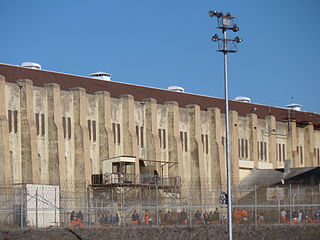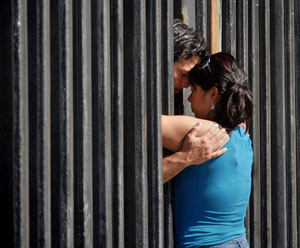This is the third in a series of posts by Justin Merrill describing his experiences with immigration law and immigrants. In the first post of the series, Merrill described how, after a summer working in an orchard in the US alongside immigrants from Mexico, Merrill’s own views shifted in the direction of open borders. In the second post, Merrill described how his Japanese wife was denied entry to the United States when she tried entering on a tourist visa, and he therefore ended up moving to Japan to start married life with her. This post decribes his encounters with the Japanese immigration bureaucracy. You can read more posts in our personal anecdote series here.
After Eri was denied entry into the US, we had to decide where we could do to live together. We devised a plan to stay with our friends Phil and Yukako in Iwakuni, Japan while I looked for a job on the Marine Corps Air Station and we looked for our own housing. I arrived on a tourist visa and I needed to get a job before it expired. Even when I was in the Marine Corps, I had never been to this base and this part of Japan was new to me, so I didn’t have any connections. The prospects were slim because the best jobs were only open to people who already had SOFA status (Status of Forces Agreement). SOFA status is a special visa status for US military members and civilians working on the base and their families. Only the most desperate job vacancies would open up to people from off base who didn’t have SOFA status. This is because it costs thousands of dollars to run background checks and apply for SOFA status, so it is cheaper to hire from the existing pool. It was frustrating that there were jobs in finance and supply administration that I was qualified for but couldn’t apply to without SOFA status.
With my visa expiring soon, I applied to the on base day care. It was one of the most difficult jobs on base but our friend Yukako worked there. Since it was the least desired position it had perpetual vacancies open to anyone who could pass the background check. Well, that’s not even true. They hired a Japanese man who spent four years in America “going to college”, but they found out after employing him for at least a year that he had instead served a four year sentence for raping a ten year old girl in the US. They didn’t do a background check on his time in the US until after I complained about his suspicious behavior, but I digress.
With just a couple weeks left on my passport I interviewed for the position as a last resort. A week later on a Friday I was called by human resources and told that I was hired and that my first day was next Tuesday. She explained to me that all new hires start on Tuesdays because they have to attend an all-day orientation class that is offered weekly. I gladly accepted the position and told her that my visa expires Sunday. She said that it wouldn’t be a problem because I was officially hired and I would be considered sponsored. She told me that on Monday I needed to come by the HR office and pick up my new ID and some paperwork that I’d need to take to the Japanese government office in Hiroshima to process my SOFA status.
On Monday, after I stopped by the base, Eri and I took the train to Hiroshima. We knew we arrived at the government offices because there was a long line of thirty or so Filipino bar girls lined up against the wall getting processed for deportation. When it was my turn I went to the window. The attendant told me to wait a moment while she spoke with her supervisor. She returned with her supervisor and two police officers. They told me to follow them into an interrogation room and told Eri to wait outside. They said that I had over-stayed my visa and that I was facing up to six months in jail, thousands of dollars in fines, and being barred from reentry. I explained that this was all a misunderstanding that would be cleared up if they just spoke with human resources on the base. They kept pressuring me, trying to make me feel guilty for something that I had no remorse for. I wasn’t too scared because I had faith that it would get cleared up, but this guy clearly wanted to make an example out of me. If he had gotten his way, it would have been devastating. Eri can’t live in the US and I couldn’t live in Japan. Plus, if I had a criminal record from violating immigration laws I might have a hard time getting residency in a third country.
After almost three hours of interrogation and mostly making me sitting alone, not even allowing me to talk to my wife, they finally let me go without an apology. They said they had cleared things up with my command. I gladly left with my opinion of immigration enforcers at a new low. The Status of Forces Agreement details how US citizens will be treated if there is a violation of the local laws. Because I didn’t officially have SOFA status yet since I was in limbo, maybe I wouldn’t have been protected if Japan wanted to play hard ball?
I was able to stay in Japan and work on base as planned. It only took three months for an ideal job to open up and I got it. Eri and I got our own place off base and started our new lives together. Soon after we moved to Japan, Eri got pregnant and we started her immigration paperwork. We were happy despite the fact that I just got out of the Marine Corps and was hoping to never look back, but now was working as a civilian.
I did a little research for this post and it looks like around the time I almost went to jail in 2006 they were changing the immigration laws in Japan. Visa overstays in Japan are now only punished with deportation and banned for 1-5 years, instead of being jailed and fined, if they turn themselves in. This change in the enforcement has halved the number of illegal immigrants living in Japan since 2006.
To be continued …
Related reading
This section includes links provided by the author but with some editorial expansion.
Japanese immigration enforcement has a history of corruption. See for instance:
- Japan’s immigration control: Gulag for gaijin, The Economist, January 18, 2012, quotes from Bryan Johnson’s lengthy account of his experience being denied entry into Japan and forced to depart at gunpoint. The original account is here. The beginning of the account is quoted below:
On my way home to Tokyo after a three-day trip to Seoul, I was planning to spend Christmas with my partner, our two dogs, and her Japanese family. I had flight and hotel reservations for ski trips to Hokkaido and Tohoku, and I was planning—with the help of regional government tourism agencies—to do feature stories to promote foreign tourism to Japan.
While taking my fingerprints, an immigration officer saw my name on a computer watch list. Without even looking through my passport, where he might find proper stamps for my travels, he marked a paper and gave it to another immigration officer. ”Come with me,” he said, and I did.
He led me to an open room. Tired after three hours’ sleep overnight in Seoul, I nodded off. Officers woke me up and insisted we do an “interview” in a private room, “for your privacy.” Sensing something amiss, I asked for a witness and a translator, to make sure they couldn’t confuse me with legal jargon in Japanese. An employee of Asiana Airlines came to witness the “interview.”
The immigration officers provided a translator—hired by immigration. She turned out to be the interpreter from hell. ”Hi, what’s your name?” I asked, introducing myself to her. “I don’t have to tell you anything,” she snapped at me. She was backed up by four uniformed immigration officials.
Q: “What are the names of the hotels where you stayed in April in the disaster zone? What are the names of people you met in Fukushima?”
A: “Well, I stayed at many places, I met hundreds of people.”
Q: “What are their names?”
A: “Well, there are so many.”
Q: “You are refusing to answer the question! You must say exactly, in detail.”
(Before I could answer, next question.)
Q: “What were you doing in May 2010? Who did you meet then?”
A: “That was a long time ago. Let me think for a moment.”
The interpreter butted in: “See, you are refusing to answer. You are lying.”
The “interpreter”, biased toward her colleagues in the immigration department, intentionally mistranslated my answers, and repeatedly accused me of making unclear statements. I understood enough of their conversation in Japanese to realise she totally got my story wrong.
Without hesitation, he wrote on a document: “No proof. Entry denied.”
“But I do have proof,” I said.
But he refused to acknowledge it. “You must sign here. You cannot refuse.”
- Japan: Welcome to Japan? by Amnesty International, May 16, 2002, documents Japan’s treatment of those seeking entry, including those with bona fide asylum applications.
- People seeking to migrate to the US are expected to meet higher bars for “morality” than just avoiding crime. See for instance the concepts of moral turpitude and good moral character. Similar ideas may apply de facto to immigration to other countries. See also the blog post Exposing the fundamentally immoral bedrock of most immigration laws by John Lee, Open Borders: The Case, March 20, 2013.
- English-language version of the Japanese government’s official description of its immigration laws: here and here.
The photograph of San Quentin prison in California featured at the top of this post was taken by Waldemar Zboralski, and is licensed under the Creative Commons Attribution-Share Alike licence.





